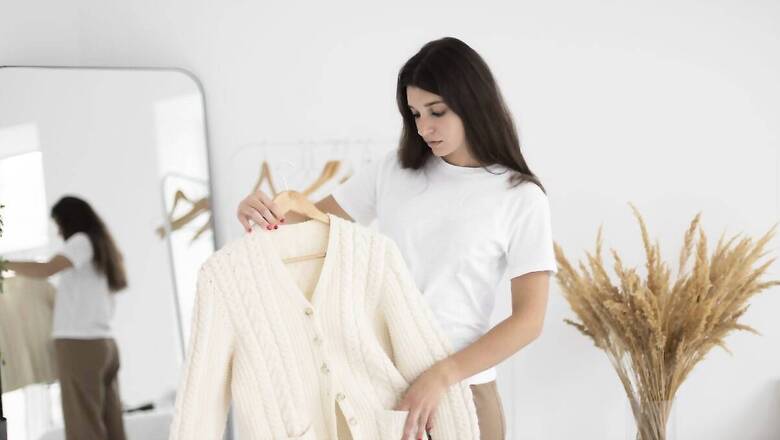
views
Slow fashion advocates for a sustainable, ethical, and responsible approach to fashion, which involves moving away from the fast-paced, mass-produced, and disposable nature of the industry, and towards a more mindful and conscious consumer culture. Emphasizing quality over quantity, slow fashion promotes the use of sustainable materials, ethical production methods, and waste reduction. It also prioritizes local production and fair labor practices, while urging consumers to invest in durable clothing rather than constantly seeking the latest trends.
Alisha Arsiwala, Lifestyle and Fashion Content Creator, says, “Slow fashion is a movement that seeks to promote sustainability, ethics, and creativity in the fashion industry. At its core, it advocates for a shift away from the fast-paced, trend-driven model of the fast fashion industry, towards a more mindful and intentional approach to clothing consumption.”
What benefits does slow fashion bring to the fashion sector?” Slow fashion brings several benefits to the fashion sector. Firstly, it promotes sustainability by reducing the environmental impact of the fashion industry. This is achieved through the use of sustainable materials, ethical production methods, and reduced waste. Secondly, slow fashion encourages a shift towards a more mindful and conscious consumer culture, where consumers prioritize quality over quantity, and are more informed about the ethical and environmental implications of their purchases. This leads to a greater appreciation for the craftsmanship and design of clothing, and a more long-term investment in a wardrobe.
Arundhati Kumar, Founder and Chief Visualiser, BEEJ, says, “Slow Fashion is about being more mindful about everything we do as an industry, the way we source, design, sell, manage inventories, manage people who create the product etc. As you slow down it allows the industry to operate more responsibly, lesser production, lower inventories, lesser dumping and better quality products. It also changes the way people consume fashion – so no more buying for a single use and then discarding. People are more conscious about what they buy, they buy better quality and use it longer and that need to always buy and buy is curbed.”
One of the key benefits of slow fashion is its focus on quality over quantity. By emphasizing well-made, durable clothing that can be worn and enjoyed for years, rather than disposable items that are quickly discarded, slow fashion reduces waste and promotes a more sustainable approach to clothing production.
Also Read: Kabita Singh on Content Creation: Why You Must Do Everything, No Matter Your Reach
Adopting slow fashion is our opportunity to change the way fashion is designed, visualised and consumed. It also allows various sections within the fashion space including weavers, artisans, etc. to be fairly recognised and paid for the work they do, and not have to unfairly compete with synthetic machine made products. These are the dying arts within the fashion space. “As an industry we are so used to thinking that we need to make more, make cheap, sell more at any cost than adopting slow fashion will need not just a mindset shift but a shift in policies, practices, supply chains etc. And finally adopting slow fashion will ensure the fashion industry is in business for a long time, because what use is a nice bag or sexy dress if there isn’t a planet to flaunt it on?” adds Kumar.
Slow fashion seeks to create a more sustainable and equitable fashion industry that benefits both people and the planet.
Ankita Dwivedi Mishra, founder, LQ Milano, says, “Instead of producing abundant amounts of low-quality apparel that quickly goes out of style and ends up in landfills, slow fashion emphasizes making classic and timeless clothing that last long. The promotion of moral and ecological behaviors is another value that the industry needs to recognize. Going slow has become challenging for brands since they are accustomed to mass manufacturing and less expensive prices. However, a brighter future can only be promised through sustainable practices. The best part of slow fashion practices is not only restricted to production, but it also expands to workers; well-being and lesser impact on the environment.”
Besides protecting the environment by using innovative design like sustainable packing and other manufacturing practices which include minimal use of resources and less use of plastics, slow fashion brands produce clothing in-house or locally. This enables complete control over the labor practices and supply chain management.
Read all the Latest Lifestyle News here



















Comments
0 comment